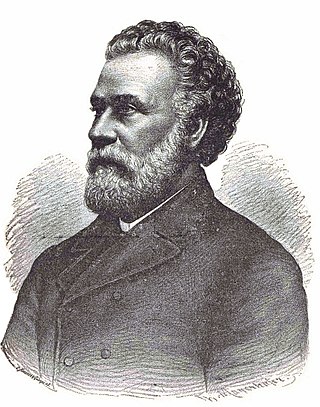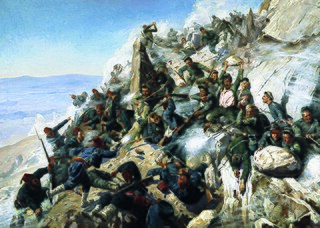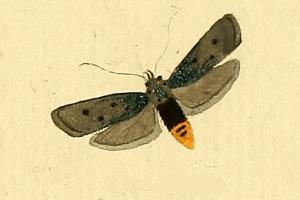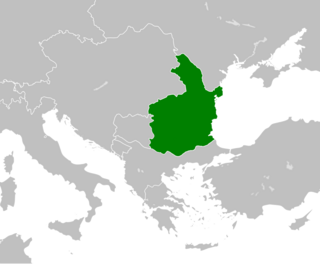
Ion Constantin Brătianu was one of the major political figures of 19th-century Romania. He was the son of Dincă Brătianu and the younger brother of Dimitrie, as well as the father of Ionel, Dinu, and Vintilă Brătianu. He also was the grandfather of poet Ion Pillat.

The Treaty of Berlin was signed on 13 July 1878. In the aftermath of the Russian victory against the Ottoman Empire in the Russo-Turkish War of 1877–1878, the major powers restructured the map of the Balkan region. They reversed some of the extreme gains claimed by Russia in the preliminary Treaty of San Stefano, but the Ottomans lost their major holdings in Europe. It was one of three major peace agreements in the period after the 1815 Congress of Vienna. It was the final act of the Congress of Berlin and included Great Britain and Ireland, Austria-Hungary, France, Germany, Italy, Russia and the Ottoman Empire. Chancellor of Germany Otto von Bismarck was the chairman and dominant personality.

The Russo-Turkish War of 1877–1878 was a conflict between the Ottoman Empire and a coalition led by the Russian Empire, and including Bulgaria, Romania, Serbia, and Montenegro. Fought in the Balkans and in the Caucasus, it originated in emerging 19th century Balkan nationalism. Additional factors included the Russian goals of recovering territorial losses endured during the Crimean War of 1853–56, re-establishing itself in the Black Sea and supporting the political movement attempting to free Balkan nations from the Ottoman Empire.

The Second Balkan War was a conflict which broke out when Bulgaria, dissatisfied with its share of the spoils of the First Balkan War, attacked its former allies, Serbia and Greece, on 16 (O.S.) / 29 (N.S.) June 1913. Serbian and Greek armies repulsed the Bulgarian offensive and counter-attacked, entering Bulgaria. With Bulgaria also having previously engaged in territorial disputes with Romania and the bulk of Bulgarian forces engaged in the south, the prospect of an easy victory incited Romanian intervention against Bulgaria. The Ottoman Empire also took advantage of the situation to regain some lost territories from the previous war. When Romanian troops approached the capital Sofia, Bulgaria asked for an armistice, resulting in the Treaty of Bucharest, in which Bulgaria had to cede portions of its First Balkan War gains to Serbia, Greece and Romania. In the Treaty of Constantinople, it lost Adrianople to the Ottomans.

The Eastern Front or Eastern Theater of World War I was a theater of operations that encompassed at its greatest extent the entire frontier between Russia and Romania on one side and Austria-Hungary, Bulgaria, the Ottoman Empire, and Germany on the other. It stretched from the Baltic Sea in the north to the Black Sea in the south, involved most of Eastern Europe, and stretched deep into Central Europe as well. The term contrasts with "Western Front", which was being fought in Belgium and France.

The Treaty of Bucharest (1918) was a peace treaty between Romania and the opposing Central Powers following the stalemate reached after the campaign of 1917. This left Romania isolated after Russia's unilateral exit from World War I.

The Allies of World War I, Entente Powers, or Allied Powers were a coalition of countries led by France, the United Kingdom, Russia, Italy, Japan, and the United States against the Central Powers of Germany, Austria-Hungary, the Ottoman Empire, Bulgaria, and their colonies during the First World War (1914–1918).

The Treaty of Bucharest of 1916 was signed between Romania and the Entente Powers on 4 /17 August 1916 in Bucharest. The treaty stipulated the conditions under which Romania agreed to join the war on the side of the Entente, particularly territorial promises in Austria-Hungary. The signatories bound themselves to keep secret the contents of the treaty until a general peace was concluded.

The Kingdom of Romania was neutral for the first two years of World War I, entering on the side of the Allied powers from 27 August 1916 until Central Power occupation led to the Treaty of Bucharest in May 1918, before reentering the war on 10 November 1918. It had the most significant oil fields in Europe, and Germany eagerly bought its petroleum, as well as food exports.

The Battle of Bazargic, also known as the Battle of Dobrich or the Dobrich epopee, took place between 5 and 7 September 1916 between a joint Bulgarian–German force, consisting mainly of the Bulgarian Third Army, and a Romanian–Russian force, including a Division of Serbian Volunteers serving under the Russian 47th Corps. The battle was part of the Romanian campaign towards the end of 1916. It ended with a Central Powers victory.

Ethmia aurifluella is a moth in the family Depressariidae. It is found in Morocco, Asia Minor, Syria, Iran, the Iberian Peninsula, France, Switzerland, Austria, Italy, Albania, North Macedonia, Bulgaria, Greece, Turkey, Romania, Ukraine and southern Russia.

Ethmia tripunctella is a moth in the family Depressariidae. It is found in North Macedonia, Bulgaria, Asia Minor, Iraq, Iran and Russia.
Ethmia haemorrhoidella is a moth in the family Depressariidae. It is found in Asia Minor, southern Russia, the Caucasus, Italy, Austria, Hungary, Slovakia, Romania, Bulgaria, Albania, North Macedonia and Greece.
Ethmia fumidella is a moth in the family Depressariidae. It can be found in Spain, Portugal, Austria, Hungary, Romania, Greece, Turkey and on Crete.

The Armistice of Focșani was an agreement that ended the hostilities between Romania and the Central Powers in World War I. It was signed on 9 December 1917 in Focșani in Romania.
Ethmia maracandica is a moth in the family Depressariidae. It was described by Rebel in 1901. It is found in Uzbekistan and Russia.
This article provides details of international football games played by the Israel national football team from 1990 to 2019.
The 2012 European Women Sevens Championship was the tenth edition of the European Women's Sevens Championship.

After a series of quick tactical victories on the numerically overpowered Austro-Hungarian forces in Transylvania, in the autumn of 1916, the Romanian Army suffered a series of devastating defeats, which forced the Romanian military and administration to withdraw to Western Moldavia, allowing the Central Powers to occupy two thirds of the national territory, including the state capital, Bucharest.

Several failed proposals were made during the 19th and 20th centuries to unify Bulgaria and Romania into a common state, under either a federation, a personal union or a confederation. Such ideas found support, especially in Bulgaria, and there were several opportunities to realize them. Proposals usually came from Bulgarians, but it was Romanians who were to hold the leading positions. These proposals ultimately failed because of cultural and political differences between the two peoples and the opposition from great powers like Austria-Hungary and especially Russia.













